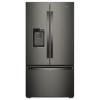Whirlpool WRF954CIHV Owners Manual - Page 36
If you experience, Possible Causes, Solution, Unusual Noise cont., Temperature and Moisture
 |
View all Whirlpool WRF954CIHV manuals
Add to My Manuals
Save this manual to your list of manuals |
Page 36 highlights
TROUBLESHOOTING First try the solutions suggested here or visit our website at producthelp.whirlpool.com If you experience Possible Causes Solution Unusual Noise (cont.) Rattling/Banging Movement of the water lines against the refrigerator cabinet or of items placed on top of the refrigerator cabinet Move excess water line away from the refrigerator cabinet or fasten excess tubing to the cabinet. See the "Connect the Water Supply" section or remove items from the top of the refrigerator. Sizzling Water dripping on the heater during This is normal. Defrost cycle Water running/Gurgling May be heard when ice melts during This is normal. the Defrost cycle and water runs into the drain pan. Buzzing and clicking Heard when the water valve opens If the refrigerator is connected to a water line, this is normal. If and closes to dispense water and/or the refrigerator is not connected to a water line, turn off the ice fill the ice maker. maker. Repetitive clicking Dual evaporator valve regulating the cooling operation. You may hear rapid repetitive clicking sounds as the unit switches from cooling 1 compartment to cooling the other. This sound is normal. Creaking/Cracking/ Grinding May be heard as ice is being ejected This is normal. from the ice maker mold. Clatter May be heard when the ice falls into This is normal. the ice storage bin. Temperature and Moisture Temperature is too warm. The refrigerator has just been installed. Allow 24 hours following installation for the refrigerator to cool completely. Cooling is turned off. Turn on cooling. See the "Using the Controls" section. The controls are not set correctly for Adjust the controls a setting colder. Check the temperature in the surrounding conditions. 24 hours. See the "Using the Controls" section. The door(s) are opened often or not Minimize door openings and keep doors fully closed. closed completely. Allows warm air to enter refrigerator. A large load of food was recently added. Allow several hours for refrigerator to return to normal temperature. Temperature is too cold The refrigerator air vent(s) are in the refrigerator/crisper. blocked. If the air vent located in the middle rear of the refrigerator compartment is blocked by items placed directly in front of it, the refrigerator will get too cold. Move items away from the air vent. The controls are not set correctly for Adjust the controls a setting warmer. Check the temperature in the surrounding conditions. 24 hours. See the "Using the Controls" section. The ice storage bin is not in the correct position. See the "Ice Maker and Storage Bin" section. Temperature is too cold The control is not set correctly for the Adjust the temperature setting. See the "Using the Controls" in the pantry drawer. items stored in drawer. section. There is interior moisture buildup. NOTE: Some moisture buildup is normal. The room is humid. The door(s) are opened often or not closed completely. Allows humid air to enter the refrigerator. A humid environment contributes to moisture buildup. Minimize door openings and close doors completely. The door(s) are blocked open. Move food packages away from door. A bin or shelf is in the way. Push bin or shelf back into the correct position. Storing liquid in open containers This adds humidity to the refrigerator interior. Keep all containers tightly covered. 36















